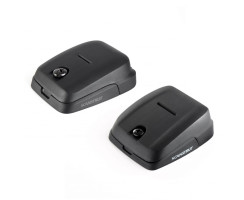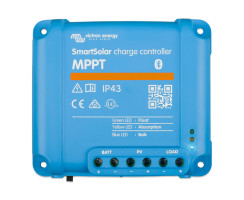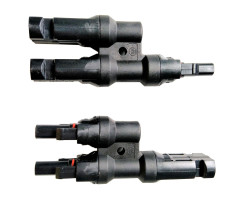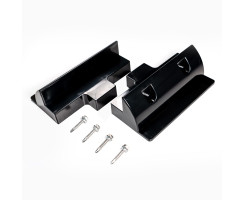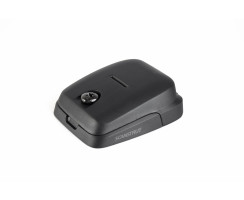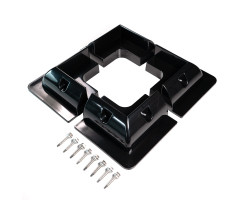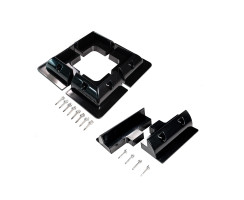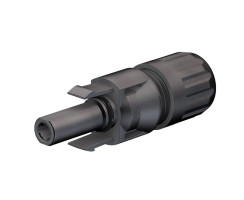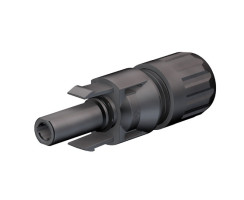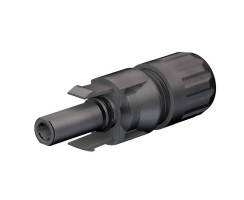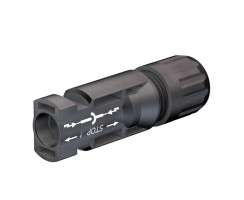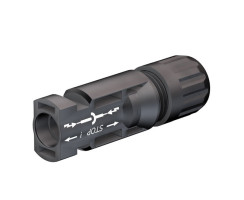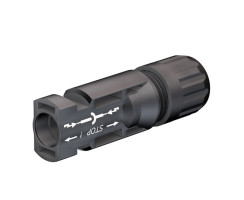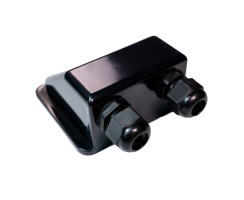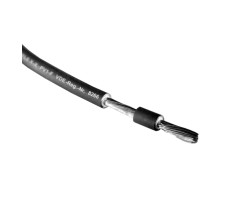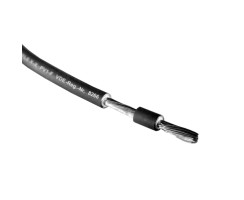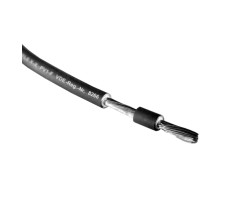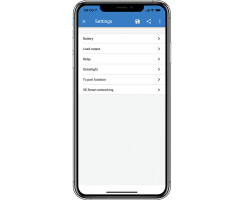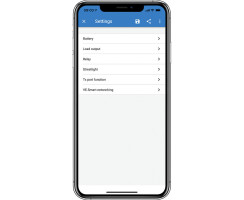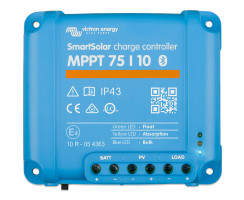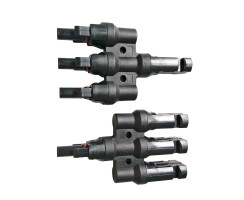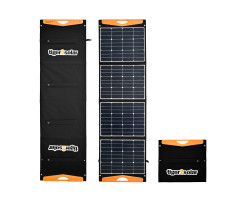Solar panel "black tiger" 120
Specifications
bypas diodes 3
cells per module 6×10
power tolerance ±3%
nominal peak power 120 Wp
nominalvoltage 40.9V
nominalcurrent 2.94A
power temperature coefficient -0 .27 %/°C
voltage temperature coefficient -0 .236%/°C
current temperature coefficient 0 .058%/°C
open circuit voltage 48.16Voc
short circuit current 3.12Asc
solar cells Sunpower Maxeon Gen .3
cell conversion Efficiency 24 .4%
operating temperature -40 to +85°C
max . system voltage 600VDC
net weight: 6,97kg
gross weight: 8,15kg
Motorhome solar panel: What you should consider when buying
With an RV or motorhome, we have to generate as much energy as possible from the smallest surface. We don't have the large roof area of a house for use, but the demands on the electronics (and thus the power consumption) in travel vehicles are increasing. For this reason, solar panels for house roofs (and unfortunately all too often for Campers, too) are not optimal for use at RVs and motorhomes.
In order to keep the prices low and competitive, technical compromises are made - e.g. (but not only) when selecting the solar cells. Calculated on the large surface of a house roof, there is still a good sum of usable energy and the matter is not given any special attention.
It's different with an RV. If we want to achieve a certain self-sufficiency with solar power, every solar panel must be uncompromisingly optimized. Efficiency of the cells, temperature coefficient, usable light spectrum ... if all these factors are taken into account, this makes a clear difference and sometimes decides whether we can easily charge the laptop again on the road or not - Not to mention eg the use of an induction hob.
Apart from the pure technology, other characteristics also play a major role in suitability as a motorhome solar panel. This includes size and shape.
Solar panels are sensitive, the cells can break, leading to loss of performance. For mounting on a vehicle roof with constant vibration and potholes in the roadway, a mounting surface that operates in hot and cold conditions, and possibly even slight torsion when mounting on expedition vehicles, a length of 2m may cause a problem.
In order to be less susceptible to vibration, a solar panel for an RV should have shorter edge lengths. Different formats also help to better use existing roof areas. Especially with vans, the panels in standard size often don't really fit well to be able to use a lot of space. The space next to skylights or ventilation is generally considered lost anyway.
The "black tiger" RV solar panel has been designed to address all of these issues. It combines uncompromisingly optimized technology and is available in 5 special formats for less susceptibility to vibration and the best use of roof space.
Motorhome solar panel "black tiger" - That's why you get more power in with it
Extremely high efficiency
With an cell efficiency of up to 24.4%, all of our "black tigers’ currently achieve the best possible technical performance. We only use top of the range Sunpower Maxeon Gen. III cells.
What does "top of the range"cells mean?
You can best imagine solar cells as a natural product that never comes out of production 100% equal. For this reason, the cells are bombarded with light under very specific conditions immediately after their production, their performance is evaluated and divided into quality levels. Only cells that achieve the highest rating (quality class Ultra Peak Performance) make it into the tigerexped solar range.
In order to achieve the best possible performance in every situation, the "black tiger" solar panel also has other characteristics that make it a real high-performance module.
High open circuit voltage
With a high open-circuit voltage, the time window for power production can increase, since the rising and setting sun can be used more.
For the use of a single solar module, the advantage of a high open circuit voltage can be significant. We explain more about this somewhat more complicated topic in the article Series or parallel connection of the solar system - which is better? in our online magazine (german language).
Mobile home solar panel with full(!) copper layer on the back
In order to achieve a high level of reliability, we use a full-surface copper contact layer on the back instead of copper connections (often also installed suboptimal on the front). This has two major advantages:
1. Less hidden area on the front and therefore higher energy yield in relation to the module size.
2. A significantly higher reliabilityof the Panel
A damage of individual cells (micro-cracks, possibly also by branches or hail), will usually lead to a total failure of the entire solar panel - the individual, important connections are interrupted, so even cells that are not damaged can no longer produce electricity. The full-surface copper contact layer of the black tiger solar panel on the other hand, guarantees the best possible supply of your electrical consumers, even with dead individual cells or cell areas.
Improved temperature coefficient - up to 25% MORE PERFORMANCE even in hot conditions
Manufacturer specifications for the performance of a solar panel refer to an ambient temperature of 25°. C. The problem: If the temperature rises, the output falls, because solar panels can work much less effectively in hot conditions. Now imagine how fast a temperature of 25° C is reached or exceeded on a camper roof... The performance drops per degree of temperature increase.
"black tiger" solar panels are working with a special optimization against that. In order to keep heat losses small, they are equipped with a high no-load voltage and low temperature coefficients (power drop per degree Celsius). For you, this means: Up to 25% more energy yield than with a conventional solar panel at warm temperatures.
We have summarized more information on this in this article (gernam).
Larger, usable light spectrum
Only a fraction of the incoming light rays (within a certain frequency range) can be used by a solar panel to generate energy. The 'black tiger' solar panel is able to use a larger frequency range than usual, i.e. a larger light spectrum. This also includes the valuable last rays of sunshine at twilight, which can still be used to generate electricity for the electrical devices in the camper.
Connection with three isolating diodes
The special wiring of a black tiger solapanel includes three isolating diodes. This guarantees maximum performance in partial shading. Cells in the sun are less affected by those in the shade.
Solar panels with special dimensions
To account for the susceptibility to vibration, torsion and heat-cold expansion on an RV roof, we intentionally keep black tiger solar panels dimensionally smaller than is often the case. The advantages are higher reliability and possible use of areas next to skylights or similar. With a width of just 42 cm, the "black tiger 120" is easy to use next to hatches, ventilations or roof boxes. Or choose our almost square special format, the "black tiger 180", which fits particularly well on most van roofs.
Framing and covering
The "black tiger" Solar panels are covered by special glass and set in an aluminium frame in elegant black.
Connect the RV solar panel
The connection is made on the back using two pre-assembled cables, each 0.9 m long, with connectors according to the MC4 standard.
For the watertight roof duct, we recommend either the multi cable duct or single (6-10mm) and double, horizontal cable bushings (5-6 mm) from Scanstrut.
Solar Controller
In order to be able to connect the solar panel to the battery, a solar controller is always required. For the connection between the solar panel and the solar controller you need solar wire of the appropriate length, an MC4 plug and an MC4 socket (see our category Solar installation material)
We recommend the solar controller SmartSolar from Victron Energy (size; ße please select appropriately). If you want to connect several panels, a larger controller is required. You can find out which controller you need as follows:
The values of an MPPT 75/15, for example, mean a maximum of 75V open circuit voltage of the panel (Voc) and a maximum of 15A nominal charging current. The Voc value is in the data sheet for each panel, the nominal charging current must be calculated.
Calculation example:
The black tiger 100 has a Voc of 37.20V. This is less than 75V and so the solar controller with 75V open circuit voltage is sufficient. To calculate the nominal charging current, divide the nominal power by 12.8V: So 100Wp divided by 12.8V gives 7.81A. This is less than 10 and therefore the solar controller MPPT 75/10 can be used for our black tiger 100.
A detailed explanation of how the charge controller is calculated can also be found here in our online Magazine (german language), as well as other articles that will certainly interest you on the subject of solar systems in motorhomes.
Are you unsure about components and sizing?
Our technical advisors will be happy to help you. Together we will determine your needs and put together a system professionally and precisely for your needs.
Simply request your non-binding and free consultation here.
fix & fertig fachgerecht zusammengestellt
Hier ist direkt alles dabei, was du neben dem(n) Solarmodul(en) noch brauchst. Vergiss das mühevolle Zusammensuchen aller großen und kleinen Teile - einfach mit einem Klick auswählen, mit der mitgelieferten Einabuanleitung einbauen und los gehts!
Erhältlich von 1 x 100Wp bis 2 x 180 Wp.
manufacturer information:
texdev GmbH
Weseler Str. 82
Alpen, 46519
NRW, DE
info@texdev.de
responsible person:
texdev GmbH
Weseler Str. 82
Alpen, 46519
NRW, DE
info@texdev.de
Power tolerance: |
+/- 3% |
voltage temperature coefficient: |
-0 .236%/°C |
Current temperature coefficient: |
-0 .058%/K |
Power temperature coefficient: |
-0 .27%/K |
Open circuit current: |
3,12 Asc |
Cell efficiency: |
24,40 % |
Operating temperature: |
-40 to +85°C |
Max system voltage: |
600VDC |
Open circuit voltage: |
48,16 Voc |
MPP Voltage: |
40,9V |
MPP Current: |
2,94A |
bypass diodes: |
3 |
Cells per module: |
6 x 11 |
max. power: |
120Wp |
Item weight: |
8,50 kg |
All reviews:


